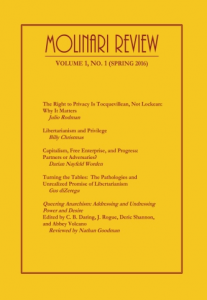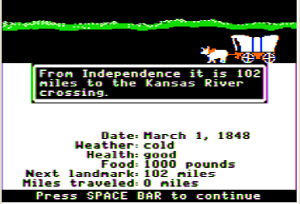Enter the Molinari Review
Shared Article from Austro-Athenian Empire
Molinari Review 1.1: What Lies Within? | Austro-Athenian Empire
[cross-posted at C4SS and BHL] The Molinari Institute (the parent organization of the Center for a Stateless Society) is proud to announce the publica…
Roderick @ aaeblog.com
Here’s an announcement from Roderick Long about the debut of the Molinari Review.
The Molinari Institute (the parent organization of the Center for a Stateless Society) is proud to announce the publication of the first issue of our new interdisciplinary, open-access, libertarian academic journal, the Molinari Review, edited by yours truly, and dedicated to publishing scholarship, sympathetic or critical, in and on the libertarian tradition, very broadly understood. (See our original call for papers.)
Kindle Amazon US Amazon US Amazon UK Amazon UK CreateSpace Store It should also be available, now or shortly, on other regional versions of Amazon. And later on it’ll be available from our website as a free PDF download (because copyright restrictions are evil).
So what’s in it?
In “The Right to Privacy Is Tocquevillean, Not Lockean: Why It Matters” Julio Rodman argues that traditional libertarian concerns with non-aggression, property rights, and negative liberty fail to capture the nature of our concern with privacy. Drawing on insights from Tocqueville and Foucault, Rodman suggests that privacy is primarily a matter, not of freedom from interference, but of freedom from observation, particularly accusatory observation.
In “Libertarianism and Privilege,” Billy Christmas charges that right-wing libertarians underestimate the extent and significance of harmful relations of privilege in society (including, but not limited to, class and gender privilege) because they misapply their own principles in focusing on proximate coercion to the exclusion of more indirect forms of coercion; but, he argues, broadening the lens of libertarian inquiry reveals that libertarian principles are more powerful tools for the analysis of privilege than privilege theorists generally suppose.
In “Capitalism, Free Enterprise, and Progress: Partners or Adversaries?,” Darian Nayfeld Worden interrogates traditional narratives of the Industrial Revolution. Distinguishing between capitalism (understood as a separation between labour and ownership/management) and free enterprise, Nayfeld Worden maintains that the rise of capitalism historically was in large part the result of a suppression of free enterprise, and that thanks to state intervention, the working-class benefited far less from industrialisation and technological innovation than they might otherwise have done.
In “Turning the Tables: The Pathologies and Unrealized Promise of Libertarianism,” Gus diZerega contends that libertarians misunderstand and misapply their own key concepts, leading them to embrace an atomistic vision of society, and to overvalue the market while undervaluing empathy and democracy. (Look for a reply or two in our next issue.)
Finally, Nathan Goodman reviews Queering Anarchism: Addressing and Undressing Power and Desire, an anthology edited by C. B. Daring, J. Rogue, Deric Shannon, and Abbey Volcano. Goodman praises the book for its illumination of many aspects of the intersection between anarchist tradition and the LGBTQ community, with particular emphasis on the tension between LGBTQ activists who seek to dismantle oppressive institutions and those who merely seek inclusion within them; but in the area of economics, he finds its authors to be too quick to dismiss the free market or to equate it with the prevailing regime of corporatist privilege.
Want to order a copy? See the ordering information above.
Want to contribute an article to an upcoming issue? Head to the journal’s webpage.
Want to support this project financially? Make a donation to the Molinari Institute General Fund.
— Roderick Long, Molinari Review 1.1: What Lies Within?
Austro-Athenian Empire (19 May 2016)


